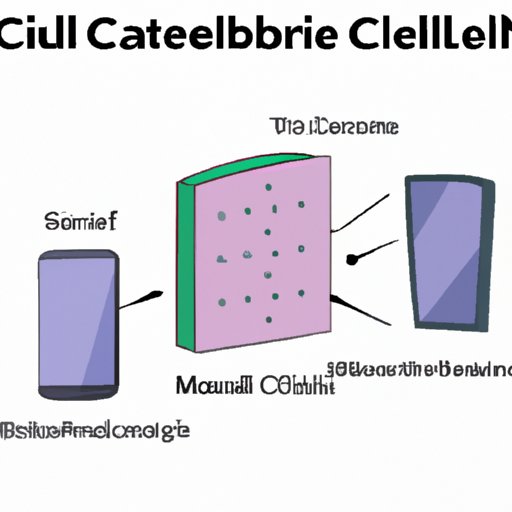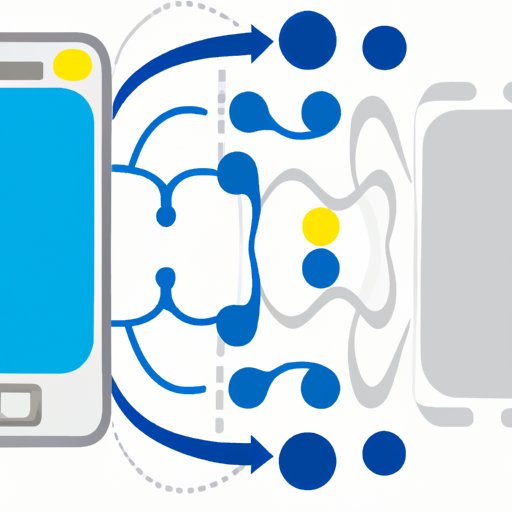Introduction
Cellular technology is a form of wireless communication that uses radio waves to transmit and receive information over a network of cell towers. It is used for many aspects of everyday life, such as making phone calls, browsing the internet, and sending text messages. As technology has advanced, so too has the capabilities of cellular technology, allowing us to do more with our devices than ever before.

Comprehensive Guide to Understanding the Basics of Cellular Technology
In order to understand how cellular technology works, it is important to look at its history and the different types of services it offers. Here we will provide an overview of these topics to give you a better understanding of this technology.
History of Cellular Technology
The first mobile phone call was made in April 1973 by Martin Cooper, an engineer working for Motorola. Cooper’s invention revolutionized communication and paved the way for the development of cellular technology. Since then, there have been numerous advances in the field, including the introduction of digital networks, the development of 3G and 4G networks, and the emergence of 5G networks.
How Does Cellular Technology Work?
Cellular technology works by using radio waves to transmit and receive information over a network of cell towers. When you make a phone call or send a text message, your device sends a signal to the nearest cell tower which then relays the information to the destination. The signal is sent back and forth between the two devices using the same process. This is why it is important to have a good signal when using cellular technology.
Different Types of Cellular Services
There are several different types of cellular services available, each offering their own set of features and benefits. These include GSM (Global System for Mobile Communications), CDMA (Code Division Multiple Access), and LTE (Long Term Evolution). Each type of service has its own advantages and disadvantages, so it is important to research them before making a decision about which one to use.
The Evolution of Cellular Technology
Since its invention in the 1970s, cellular technology has come a long way. In the past few decades, there have been significant advancements in the field that have led to the development of faster, more reliable networks and devices. Let’s take a look at some of the major developments that have taken place.
Past Developments
In the early days of cellular technology, the focus was on creating a network that could support the growing number of mobile devices. This led to the development of GSM and CDMA networks, which were able to handle the increasing demand for data and voice services. As technology advanced, 3G networks were introduced, which allowed for faster speeds and improved coverage.
Current Technologies
Today, most networks are powered by 4G LTE technology, which provides faster speeds and better coverage than ever before. Additionally, many networks are now introducing 5G technology, which promises to be even faster and more reliable than previous generations of cellular technology.
Future Developments
As technology continues to evolve, so too does cellular technology. In the future, we can expect to see even faster speeds, greater coverage, and improved security for mobile networks. Additionally, new technologies such as machine learning and artificial intelligence are likely to be integrated into cellular networks to further improve their performance.
How Does Cellular Technology Impact Our Lives?
Cellular technology has had a major impact on our lives, both for better and for worse. Let’s take a look at some of the benefits and drawbacks of this technology.
Benefits of Cellular Technology
One of the biggest benefits of cellular technology is that it allows us to stay connected no matter where we are. We can make phone calls, send text messages, browse the internet, and access a variety of other services from anywhere in the world. Additionally, cellular technology has enabled businesses to communicate more effectively and efficiently, improving customer service and reducing costs.
Drawbacks of Cellular Technology
While there are many benefits of cellular technology, there are also some drawbacks. One of the biggest concerns is the potential health risks associated with radiation emitted by cell phones and other devices. Additionally, some people worry about the privacy implications of using cellular networks as companies have access to large amounts of personal data.

The Role of Cellular Technology in Modern Society
Cellular technology plays an important role in modern society. It has enabled us to stay connected and communicate more easily than ever before. Additionally, it has had a major impact on businesses, the economy, and education.
Connectivity and Communication
Cellular technology has revolutionized the way we communicate and stay connected. We can now make phone calls, send text messages, and browse the internet from almost anywhere in the world. This has enabled us to stay in touch with friends and family, no matter where they are located.
Businesses and the Economy
Cellular technology has enabled businesses to operate more efficiently and effectively. Companies can now connect with customers, suppliers, and partners instantly, improving relationships and reducing costs. Additionally, the proliferation of mobile devices has created an entirely new industry, resulting in the growth of the global economy.
Education and Social Interaction
Cellular technology has also had a major impact on education. Students can now access educational materials from any location, allowing them to pursue their studies from home. Additionally, social media platforms have enabled people to interact and share ideas more easily than ever before.
Conclusion
Cellular technology has revolutionized the way we communicate and stay connected. It has enabled businesses to operate more efficiently and has had a major impact on the economy. Additionally, it has enabled students to access educational materials from anywhere and has enabled people to interact and share ideas more easily. In short, cellular technology has had a profound effect on our lives and will continue to do so in the future.
(Note: Is this article not meeting your expectations? Do you have knowledge or insights to share? Unlock new opportunities and expand your reach by joining our authors team. Click Registration to join us and share your expertise with our readers.)
